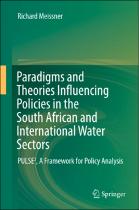 ResearchSpace
ResearchSpace
Paradigms and Theories Influencing Policies in the South African and International Water Sectors: PULSE³, A Framework for Policy Analysis
JavaScript is disabled for your browser. Some features of this site may not work without it.
- ResearchSpace
- →
- Research Publications/Outputs
- →
- Books
- →
- View Item
| dc.contributor.author |
Meissner, Richard

|
|
| dc.date.accessioned | 2017-09-27T12:38:13Z | |
| dc.date.available | 2017-09-27T12:38:13Z | |
| dc.date.issued | 2017-01 | |
| dc.identifier.citation | Meissner, R. 2017. Paradigms and Theories Influencing Policies in the South African and International Water Sectors: PULSE³, A Framework for Policy Analysis. | en_US |
| dc.identifier.isbn | 978-3-319-48546-1 | |
| dc.identifier.uri | http://www.springer.com/gp/book/9783319485461 | |
| dc.identifier.uri | DOI 10.1007/978-3-319-48547-8_1 | |
| dc.identifier.uri | https://www.researchgate.net/publication/310799217_Paradigms_and_Theories_Influencing_Policies_in_the_South_African_and_International_Water_Sectors_PULSE_A_Framework_for_Policy_Analysis | |
| dc.identifier.uri | http://hdl.handle.net/10204/9610 | |
| dc.description | Copyright: 2017 The Author | en_US |
| dc.description.abstract | In this introductory chapter, I will talk about the nature of water research in the South African context. In short, research scientists study water resource management in its various facets to ameliorate problems that could negatively affect human populations and the natural environment. This is the popular view of water research, its nature and motivation for embarking on the endeavour. There is, however, more than meets the eye. A subliminal reality exists when we conduct water research: the myths we adhere to as water researchers. In this chapter, I will explore the myth aspect and other elements characterising water research in more detail. I organise the chapter as follows. In the first section, I will investigate and report on myths in International Relations theory and link the arguments contained in this rendition with that of water resource governance and management. I will then tell the reader what the book is about; in other words, the essence of the book and why I think it is necessary to write a book reporting on my investigation in research paradigms and theories in water governance and management. I will then demonstrate the issues I will address in the rest of the book with three short case studies: acid mine drainage, integrated water resource management and transboundary river cooperation. In the penultimate section of the chapter, I will elaborate on how I think we should think about water research. I then elaborate on critical solidarity as a way to enact such thinking. I will then end with a conclusion. | en_US |
| dc.language.iso | en | en_US |
| dc.publisher | Springer | en_US |
| dc.relation.ispartofseries | Worklist;18318 | |
| dc.subject | South African water research | en_US |
| dc.subject | Integrated water resource management | en_US |
| dc.subject | Transboundary river cooperation | en_US |
| dc.title | Paradigms and Theories Influencing Policies in the South African and International Water Sectors: PULSE³, A Framework for Policy Analysis | en_US |
| dc.title.alternative | PULSE³, A Framework for Policy Analysis | en_US |
| dc.type | Book | en_US |
| dc.identifier.apacitation | Meissner, R. (2017). <i>Paradigms and Theories Influencing Policies in the South African and International Water Sectors: PULSE³, A Framework for Policy Analysis</i>. Springer. http://hdl.handle.net/10204/9610 | en_ZA |
| dc.identifier.chicagocitation | Meissner, Richard. <i>Paradigms and Theories Influencing Policies in the South African and International Water Sectors: PULSE³, A Framework for Policy Analysis</i>. n.p.: Springer. 2017. http://hdl.handle.net/10204/9610. | en_ZA |
| dc.identifier.vancouvercitation | Meissner R. Paradigms and Theories Influencing Policies in the South African and International Water Sectors: PULSE³, A Framework for Policy Analysis. [place unknown]: Springer; 2017.http://hdl.handle.net/10204/9610 | en_ZA |
| dc.identifier.ris | TY - Book AU - Meissner, Richard AB - In this introductory chapter, I will talk about the nature of water research in the South African context. In short, research scientists study water resource management in its various facets to ameliorate problems that could negatively affect human populations and the natural environment. This is the popular view of water research, its nature and motivation for embarking on the endeavour. There is, however, more than meets the eye. A subliminal reality exists when we conduct water research: the myths we adhere to as water researchers. In this chapter, I will explore the myth aspect and other elements characterising water research in more detail. I organise the chapter as follows. In the first section, I will investigate and report on myths in International Relations theory and link the arguments contained in this rendition with that of water resource governance and management. I will then tell the reader what the book is about; in other words, the essence of the book and why I think it is necessary to write a book reporting on my investigation in research paradigms and theories in water governance and management. I will then demonstrate the issues I will address in the rest of the book with three short case studies: acid mine drainage, integrated water resource management and transboundary river cooperation. In the penultimate section of the chapter, I will elaborate on how I think we should think about water research. I then elaborate on critical solidarity as a way to enact such thinking. I will then end with a conclusion. DA - 2017-01 DB - ResearchSpace DP - CSIR KW - South African water research KW - Integrated water resource management KW - Transboundary river cooperation LK - https://researchspace.csir.co.za PY - 2017 SM - 978-3-319-48546-1 T1 - Paradigms and Theories Influencing Policies in the South African and International Water Sectors: PULSE³, A Framework for Policy Analysis TI - Paradigms and Theories Influencing Policies in the South African and International Water Sectors: PULSE³, A Framework for Policy Analysis T2 - PULSE³, A Framework for Policy Analysis UR - http://hdl.handle.net/10204/9610 ER - | en_ZA |





